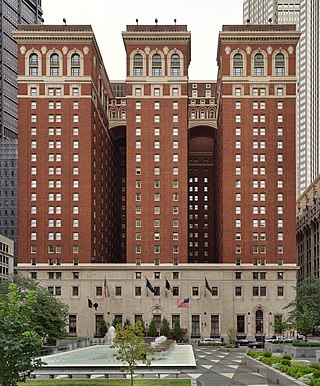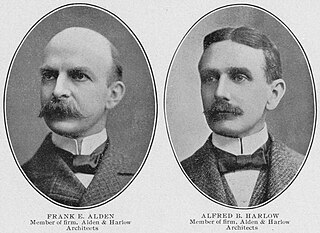
Pittsburgh is a city in and the county seat of Allegheny County, Pennsylvania, United States. It is the second-most populous city in Pennsylvania, after Philadelphia, and the 68th-most populous city in the U.S., with a population of 302,971 as of the 2020 census. The city is located in southwestern Pennsylvania at the confluence of the Allegheny River and the Monongahela River, which combine to form the Ohio River. It anchors the Pittsburgh metropolitan area, which had a population of 2.457 million residents and is the largest metro area in both the Ohio Valley and Appalachia, the second-largest in Pennsylvania, and the 26th-largest in the U.S. Pittsburgh is the principal city of the greater Pittsburgh–Weirton–Steubenville combined statistical area which includes parts of Ohio and West Virginia.

Carnegie Mellon University (CMU) is a private research university in Pittsburgh, Pennsylvania. The institution was established in 1900 by Andrew Carnegie as the Carnegie Technical Schools. In 1912, it became the Carnegie Institute of Technology and began granting four-year degrees. In 1967, it became Carnegie Mellon University through its merger with the Mellon Institute of Industrial Research, founded in 1913 by Andrew Mellon and Richard B. Mellon and formerly a part of the University of Pittsburgh.

Oakland is the academic and healthcare center of Pittsburgh and one of the city's major cultural centers. Home to three universities, museums, hospitals, shopping venues, restaurants, and recreational activities, this section of the city also includes two city-designated historic districts: the mostly residential Schenley Farms Historic District and the predominantly institutional Oakland Civic Center Historic District, as well as the locally-designated Oakland Square Historic District.

Duquesne University of the Holy Spirit is a private Catholic research university in Pittsburgh, Pennsylvania. Founded by members of the Congregation of the Holy Spirit, Duquesne first opened as the Pittsburgh Catholic College of the Holy Ghost in October 1878 with an enrollment of 40 students and a faculty of six. In 1911, the college became the first Catholic university-level institution in Pennsylvania. It is named for an 18th-century governor of New France, Michel-Ange Duquesne de Menneville.

The Carnegie Museum of Art is an art museum in the Oakland neighborhood of Pittsburgh, Pennsylvania. The museum was originally known as the Department of Fine Arts, Carnegie Institute and was formerly located at what is now the Main Branch of the Carnegie Library of Pittsburgh. The museum's first gallery was opened for public use on November 5, 1895. Over the years, the gallery vastly increased in size, with a new building on Forbes Avenue built in 1907. In 1963, the name was officially changed to Museum of Art, Carnegie Institute. The size of the gallery has tripled over time, and it was officially renamed in 1986 to "Carnegie Museum of Art" to indicate it clearly as one of the four Carnegie Museums.

Carnegie Mellon Silicon Valley is a degree-granting branch campus of Carnegie Mellon University located in Mountain View, California. It was established in 2002 at the NASA Ames Research Center in Moffett Field.

The Duquesne Gardens was the main sports arena located in Pittsburgh, Pennsylvania, during the first half of the 20th century. Built in 1890, the building originally served as a trolley barn, before becoming a multi-purpose arena. The Gardens opened three years after a fire destroyed the city's prior sports arena, the Schenley Park Casino, in 1896. Over the years, the Gardens was the home arena of several of Pittsburgh's historic sports teams, such as ice hockey's Pittsburgh Pirates and Pittsburgh Hornets. The Western Pennsylvania Hockey League, which was the first ice hockey league to openly hire and trade players, played all of its games at the Gardens. The arena was also the first hockey rink to ever use glass above the dasher boards. Developed locally by the Pittsburgh Plate Glass Company, Herculite glass was first tested in Pittsburgh. Most rinks were using wire mesh before the shatterproof glass was invented. Finally, the Pittsburgh Ironmen, a charter member of the Basketball Association of America, played at the Gardens from 1946 to 1947.

Greater Pittsburgh is the metropolitan area surrounding the city of Pittsburgh in Western Pennsylvania, United States. The region includes Allegheny County, Pittsburgh's urban core county and economic hub, and seven adjacent Pennsylvania counties: Armstrong, Beaver, Butler, Fayette, Lawrence, Washington, and Westmoreland in Western Pennsylvania, which constitutes the Pittsburgh, PA Metropolitan Statistical Area MSA as defined by the U.S. Office of Management and Budget.

Fitzgerald Field House is a 4,122-seat multi-purpose athletic venue on the campus of the University of Pittsburgh in Pittsburgh, Pennsylvania, United States. Fitzgerald Field House is named for Rufus Fitzgerald, a past chancellor (1945–1955) of the university. It is the primary home competition venue for the university's gymnastics, volleyball, and wrestling teams.

Sports in Pittsburgh have been played dating back to the American Civil War. Baseball, hockey, and the first professional American football game had been played in the city by 1892. Pittsburgh was first known as the "City of Champions" when the Pittsburgh Pirates, Pittsburgh Panthers football team, and Pittsburgh Steelers won multiple championships in the 1970s. Today, the city has three major professional sports franchises, the Pirates, Steelers, and Penguins; while the University of Pittsburgh Panthers compete in a Division I Power Five conference, the highest level of collegiate athletics in the United States, in both football and basketball. Local universities Duquesne and Robert Morris also field Division I teams in men's and women's basketball and Division I FCS teams in football. Robert Morris also fields Division I men's and women's ice hockey teams.

The economy of Pittsburgh, Pennsylvania is diversified, focused on services, medicine, higher education, tourism, banking, corporate headquarters and high technology. Once the center of the American steel industry, and still known as "The Steel City", today the city of Pittsburgh has no steel mills within its limits, though Pittsburgh-based companies such as US Steel, Ampco Pittsburgh and Allegheny Technologies own several working mills in the Pittsburgh metropolitan area.
College Hockey East (CHE) is a mixed American Collegiate Hockey Association (ACHA) Division 2 and Division 3 league for universities in the Western Pennsylvania region.

The Omni William Penn Hotel is a 23 floor hotel located at 530 William Penn Place on Mellon Square in downtown Pittsburgh, Pennsylvania. A variety of luminaries have stayed at the hotel, including John F. Kennedy. The hotel staff innovated Lawrence Welk's now famous bubble machine, and it was the site of Bob Hope's marriage proposal in 1934. The hotel has won numerous awards including being named to the "Best of Weddings 2009" list by The Knot and receiving the Editor's Choice Award in the Business Hotels category on Suite101.com.

The City Game is an annual college basketball game between the University of Pittsburgh Panthers and the Duquesne University Dukes. The term "City Game" is also used refer to women's basketball games played annually between the two universities and may also be used to refer to other athletic competitions between the two schools.

Longfellow, Alden & Harlow, of Boston, Massachusetts, and Pittsburgh, Pennsylvania, was the architectural firm of Alexander Wadsworth Longfellow Jr. (1854–1934), Frank Ellis Alden (1859–1908), and Alfred Branch Harlow (1857–1927). The firm, successors to H. H. Richardson, continued to provide structures in the Romanesque revival style established by Richardson that is often referred to as Richardsonian Romanesque.
William S. Dietrich II was a successful industrialist who took over and expanded Dietrich Industries, a steel framing manufacturer which he eventually sold to Worthington Industries. Late in life, he made two of the largest charitable contributions in higher education history, to the University of Pittsburgh and Carnegie Mellon University.

David J. Dausey is an American epidemiologist, professor and academic administrator. He is the Provost of Duquesne University in Pittsburgh, Pennsylvania. He was formerly the Provost of Mercyhurst University in Erie, Pennsylvania. Prior to Mercyhurst, Dausey was a professor at Carnegie Mellon University in Pittsburgh, Pennsylvania, where he maintains an honorary faculty appointment as a Distinguished Service Professor. Dausey was also Policy Researcher at the RAND Corporation.
The following is a timeline of the history of the city of Pittsburgh, Pennsylvania, US.

Advanced Robotics for Manufacturing (ARM), also known as ARM Institute, is a consortium created in 2017 through a Department of Defense grant won by Carnegie Mellon University. ARM is structured as a public-private partnership and the Manufacturing USA Institutes, a network of 16 institutes dedicated to advancing technologies used in manufacturing. ARM was the 14th institute created and focuses on funding innovations in robotics and workforce development.
The 1931 Carnegie Tech Tartans football team represented the Carnegie Institute of Technology—now known as Carnegie Mellon University—as an independent during the 1931 college football season. Led by 17th-year head coach Walter Steffen, the Tartans compiled a record of 3–5–1.
















